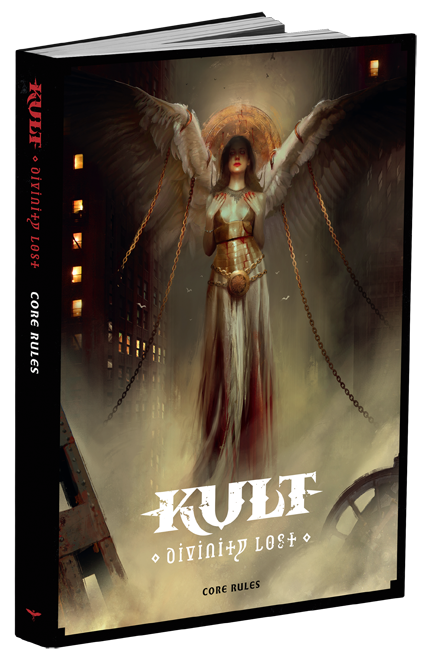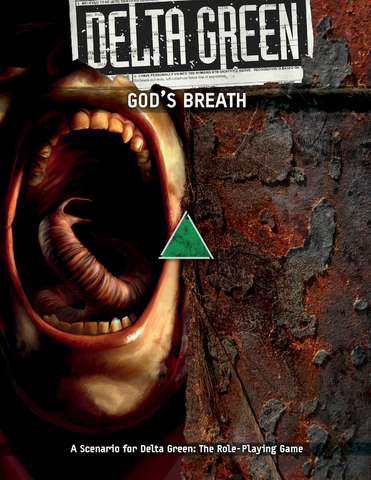Kult: Divinity Lost Horror; Dark Fantasy; Psychological; Narrative-Driven; Character Customization; Investigation; Mature
Kult: Divinity Lost is a tabletop roleplaying game renowned for its dark and mature themes, exploring the idea that reality is an illusion hiding a darker truth. Players navigate a world of horror, social intrigue, and existential dread, gradually awakening to their own lost divinity. The game distinguishes itself through its narrative-driven mechanics, character customization options, and the potential for intense, personal horror experiences. It targets a mature audience comfortable with exploring challenging and disturbing themes.
Theme and Setting
Kult: Divinity Lost plunges players into a contemporary world that is, in reality, a prison. The game's core premise is that the reality we perceive is an illusion, meticulously crafted to keep humanity from recognizing its own divine potential. This illusion is maintained by sinister forces, and as players delve deeper, they begin to see glimpses of the horrific reality that lies beneath. Imagine towering citadels of Metropolis looming over skyscrapers, or the faint scent of blood emanating from a long-abandoned slaughterhouse; these are hints of the world beyond the veil. The setting blends elements of dark fantasy, gothic horror, and modern-day urban environments, creating a unique and unsettling atmosphere. Characters might encounter anything from secret societies and ancient gods to nightmarish creatures and twisted reflections of themselves. The game leverages philosophical and religious depth, drawing inspiration from Gnosticism and other occult practices, to create a truly immersive and thought-provoking experience. The overall feeling is isolation, paranoia, and a constant struggle against overwhelming forces.
Core Mechanics and Rules
Kult: Divinity Lost utilizes a ruleset based on Powered by the Apocalypse (PbtA), emphasizing narrative and player agency. Instead of traditional skill checks, players roll two ten-sided dice, adding modifiers, and aim for a result of 10 or higher to succeed, or 15 or higher for a strong hit. The game master (GM) plays a crucial role in building the campaign around the player characters (PCs), tailoring the experience to evoke personal horror. The focus is less on tactical combat (though it exists) and more on the characters' psychological and emotional journeys as they confront the disturbing truths of their world. Character creation involves selecting an Archetype, which defines a character's starting point on their path to awakening: Sleeper, Aware, and Enlightened. These archetypes guide their progression and influence their interactions with the game world. The earlier editions used a Mental Balance system to reflect a character's sanity, but it was removed in Divinity Lost due to practicality issues. Instead, the system is based around character archetypes.
What Makes It Unique
Several elements set Kult: Divinity Lost apart from other tabletop RPGs. First, the core concept of reality as an illusion is both intriguing and terrifying, allowing for exploration of complex philosophical themes. Second, the game's emphasis on personal horror means that the GM actively works to create scenarios that resonate with each player's individual fears and vulnerabilities. Third, the blend of modern and ancient mythology creates a rich tapestry of lore and potential antagonists. Furthermore, the game embraces mature and controversial themes, such as mental illness, social injustice, and existential dread, which while potentially triggering, allow for a deeper exploration of the human condition. The use of real-world occult practices to inspire the magic system, such as Hermeticism, also adds realism to the setting. For example, sorcerers have long casting times for spells, and require specific somatic requirements, resembling religious rituals.
Target Audience and Player Experience
Kult: Divinity Lost is designed for a mature audience comfortable with exploring dark and challenging themes. Players who enjoy narrative-driven games with a focus on character development and psychological horror will find it particularly appealing. The game is not for those seeking lighthearted adventure or straightforward combat; rather, it offers an opportunity to confront unsettling truths and explore the depths of the human psyche. The player experience is characterized by a sense of unease, paranoia, and a gradual descent into darkness. Successful campaigns often involve intricate social intrigue, moral dilemmas, and the constant threat of losing one's sanity. Ultimately, Kult: Divinity Lost offers a unique and unforgettable roleplaying experience for those brave enough to confront its disturbing realities. Some have compared starting characters to John Murdoch from Dark City, or Thomas A. Anderson from the Matrix, as normal people who start to notice the world around them is not what they thought it was.



